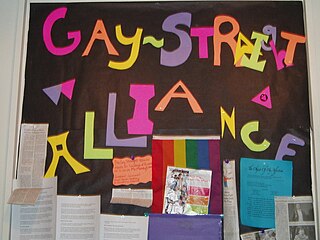
The American Civil Liberties Union (ACLU) is an American nonprofit organization founded in 1920 "to defend and preserve the individual rights and liberties guaranteed to every person in this country by the Constitution and laws of the United States". The ACLU works through litigation and lobbying and has over 1,800,000 members as of July 2018, with an annual budget of over $300 million. Affiliates of the ACLU are active in all 50 states, Washington, D.C., and Puerto Rico. The ACLU provides legal assistance in cases where it considers civil liberties at risk. Legal support from the ACLU can take the form of direct legal representation or preparation of amicus curiae briefs expressing legal arguments when another law firm is already providing representation.

Itawamba County is a county located in the U.S. state of Mississippi. As of the 2020 United States Census, the population was 23,863. Its county seat is Fulton. The county is part of the Tupelo, MS Micropolitan Statistical Area.

Cumberland is the northeasternmost town in Providence County, Rhode Island, United States, first settled in 1635 and incorporated in 1746. The population was 36,405 at the 2020 census, making it the seventh-largest municipality and the largest town in the state.

A promenade dance, commonly called a prom in American English, is a dance party for high school students. It may be offered in semi-formal black tie or informal suit for boys, and evening gowns for girls. This event is typically held near the end of the school year. There may be individual junior and senior proms or they may be combined.
Heterosexism is a system of attitudes, bias, and discrimination in favor of female–male sexuality and relationships. According to Elizabeth Cramer, it can include the belief that all people are or should be heterosexual and that heterosexual relationships are the only norm and therefore superior.
Hall v Durham Catholic School Board was a 2002 court case in which Marc Hall, a Canadian teenager, fought a successful legal battle against the Durham Catholic District School Board to bring a same-sex date to his high school prom. The case made Canadian and international headlines.
GLBTQ Legal Advocates & Defenders (GLAD) is a non-profit legal rights organization in the United States. The organization works to end discrimination based on sexual orientation, HIV status, and gender identity and expression. The organization primarily achieves this goal through litigation, advocacy, and education work in all areas of LGBT rights and the rights of people living with HIV. In addition, GLAD operates a legal information line, GLAD Answers, where LGBTQ & HIV+ residents of New England can receive attorney referrals and information about their rights. The organization changed its name to GLBTQ Legal Advocates & Defenders in February 2016.

A Gay–Straight Alliance, Gender-Sexuality Alliance (GSA) or Queer–Straight Alliance (QSA) is a student-led or community-based organisation, found in middle schools, high schools, colleges, and universities. These are primarily in the United States and Canada. Gay–straight alliance is intended to provide a safe and supportive environment for lesbian, gay, bisexual, transgender, and all (LGBTQ+) sometimes being referred to as "alphabet soup", children, teenagers, and youth as well as their cisgender heterosexual allies. In middle schools and high schools, GSAs are overseen by a responsible teacher. The first GSAs were established in the 1980s. Scientific studies show that GSAs have positive academic, health, and social impacts on schoolchildren of a minority sexual orientation and/or gender identity. Numerous judicial decisions in United States federal and state court jurisdictions have upheld the establishment of GSAs in schools, and the right to use that name for them.

Egale Canada is an advocacy organization founded in 1986 by Les McAfee to advance equality for Canadian lesbian, gay, bisexual and transgender (LGBT) people and their families, across Canada.
Aaron Fricke is an American gay rights activist and author. He was born in Pawtucket, Rhode Island. He is best known for Fricke v. Lynch, a legal case in which he won his first amendment legal right to attend prom and for his autobiography Reflections of a Rock Lobster in which he details growing up gay culminating at that high school dance.
Anti-prom, also known as morp, is a social event often staged by high school students as a protest against, or boycott of, their school's official prom, as an alternative celebration. Other times, it may be an unofficial prom, planned by the students themselves so that it is not under the control of the school.

Murray High School is the only high school in the Murray City School District in Murray, Utah. Murray High School is in the Salt Lake City metropolitan area with 1,465 students enrolled in the 2019–20 school year. The school enrolls students in grades 10–12. The school's mascot is the Spartan, and the school colors are orange and black. Murray High is a 5-A school in Utah's 6 Division high school sports leagues. The Disney Channel reality show High School Musical: Get in the Picture was shot on the Murray High campus in 2008, and American Idol season 7 runner-up David Archuleta attended the school. The school also offers the highest number of Salt Lake Community College Concurrent Enrollment classes in the state of Utah.
The Itawamba County School District is a public school district based in Fulton, Mississippi, United States. The district's boundaries parallel that of Itawamba County.
LGBT movements in the United States comprise an interwoven history of lesbian, gay, bisexual, transgender and allied movements in the United States of America, beginning in the early 20th century and influential in achieving social progress for lesbian, gay, bisexual, transgender and transsexual people.
Fricke is a surname. Notable people with the surname include:
Gillman v. Holmes County School District, 567 F. Supp. 2d 1359, was a decision in the Northern District of Florida which upheld a student's First Amendment right to express pro-gay sentiments at Ponce de Leon High School.

The 2010 Itawamba County School District prom controversy took place in Itawamba County, Mississippi, and began when lesbian student Constance McMillen was refused permission to take her girlfriend to the Itawamba County Agricultural High School prom. As a result of a lawsuit brought against the school, the school canceled the prom. Parents were encouraged to organize a private prom, but they canceled it. A second private prom was organized and represented to be the official prom. Meanwhile, parents organized a secret prom to which McMillen was not invited and which most of the student body attended. The school district settled the lawsuit by agreeing to a payment to McMillen and adoption of a sexual orientation non-discrimination policy.
The state of Georgia mostly improved in its treatment of lesbian, gay, bisexual and transgender residents in the years after 1970, when LGBT residents began to openly establish events, organizations and outlets for fellow LGBT residents and increase in political empowerment.

Ahlquist v. Cranston, 840 F. Supp. 2d 507, was a case where the United States District Court for the District of Rhode Island ruled that a "School Prayer" banner posted in Cranston High School West was a violation of the Establishment Clause of the United States Constitution and ordered its removal. The suit was brought by Mark Ahlquist on behalf of his minor daughter Jessica Ahlquist, a student at the school, with the assistance of the American Civil Liberties Union.

The Prom is a musical with music by Matthew Sklar, lyrics by Chad Beguelin, and a book by Bob Martin and Beguelin, based on an original concept by Jack Viertel. The musical follows four Broadway actors lamenting their days of fame, as they travel to the conservative town of Edgewater, Indiana, to help a lesbian student banned from bringing her girlfriend to high school prom.










